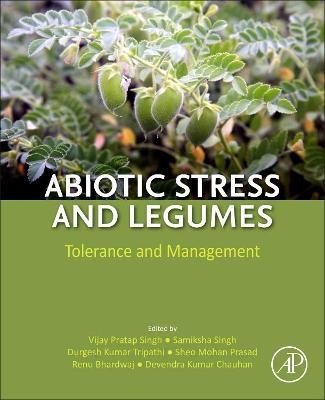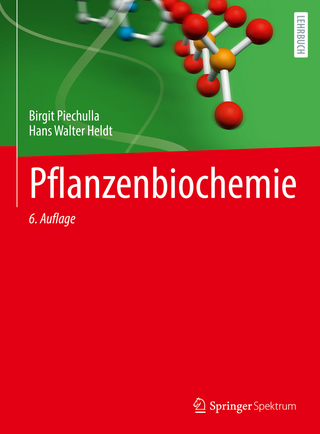
Abiotic Stress and Legumes
Academic Press Inc (Verlag)
978-0-12-815355-0 (ISBN)
Dr. Singh obtained his PhD from the University of Allahabad on topic “Oxidative stress and antioxidant system in some cyanobacteria simultaneously exposed to UV-B and heavy metal. He has authored 102 publications, as well as editorials in reputed journals. His area of research interest is the role of nitric oxide and hydrogen sulphide signalling in the regulation of abiotic stress in plants. Dr. Singh is also working as an editor and reviewer of several reputed international journals. Vijay Pratap Singh is an Assistant Professor, Department of Botany C.M.P. Post Graduate College, University of Allahabad, India. Dr. Singh has obtained his D.Phil. degree from University of Allahabad. He has authored 95 publications including book chapters and editorials in reputed journals. He has edited several books with Elsevier, Wiley, CRC Press, Nova Publisher, Studium Press, etc. His area of research interest is regulation of abiotic stress in plants with special emphasis on nitric oxide, hydrogen sulfide, reactive oxygen species and phytohormonal signaling. Dr. Singh is also working as an editor and reviewer of reputed international journals. Samiksha Singh is working as a D.Phil. research scholar in Department of Botany, University of Allahabad, Allahabad, India. She has obtained her M.Sc. degree in Environmental Science from Lucknow University. Her area of research interest is management of abiotic stress in plants using biochemical and molecular approach. Samiksha Singh is a Junior Research Fellow in the Plant Physiology and Biochemistry Laboratory, Department of Botany, University of Allahabad, India. Her area of research interest is management of metal stress in plants using biochemical and molecular approach with emphasis on nitric oxide and hydrogen sulfide signaling. She has authored 33 publications in reputed international journals. She has edited books with Wiley, Nova Science Publisher, Studium Press and others. Dr. Durgesh Kumar Tripathi is currently an Associate Professor at Amity Institute of Organic Agriculture, Amity University Uttar Pradesh, Noida, India. He is the recipient of ‘Dr DS Kothari Post-Doctoral Fellowship’ of the UGC, New Delhi. Dr. Tripathi has received his D.Phil. in Science from University of Allahabad, India. During this period, Dr. Tripathi worked extensively on phytolith analysis, crop stress physiology, agro-nanotechnology and molecular biology. He has expertise on laser spectroscopy. His research interests encompass stress tolerance mechanisms in plants. Presently, he is working with nano-materials and their interactions with plants to find out their detoxification mechanisms, he is also working on Silicon, Nitric oxide and hormonal crosstalk against abiotic stress in plants. Professor Prasad obtained his academic degrees from Banaras Hindu University in Varanasi, India. He has authored 150 scientific publications. His main areas of research are the physiology and biochemistry of plants, and cyanobacteria under abiotic stresses (e.g., UV-B, heavy metals, pesticides, temperature, salinity, high light), with special reference to abiotic stress management. Professor Prasad is also working as an editor and reviewer of several reputed international journals. Sheo Mohan Prasad is as a Professor in the Department of Botany, University of Allahabad, having obtained his academic degrees from Banaras Hindu University, Varanasi, India. Professor Prasad has authored 160 scientific publications. His main area of research is physiology and biochemistry of plants as well as cyanobacteria under abiotic stresses i.e. UV-B, heavy metals, pesticides, temperature, salinity, high light, etc with special reference to abiotic stress management. Professor Prasad is also working as editor and reviewer of several reputed international journals. He has edited several volumes of books with CRC Press, Wiley, Nova Publisher, Studiem Press, etc. Renu Bhardwaj is a Professor in Botanical and Environmental Sciences at Guru Nanak Dev University in Amritsar, Punjab, India. Devendra Kumar Chauhan is a Professor and Head of Department of Botany at the University of Allahabad, India. He has 35 years’ worth of teaching experience, has edited 5 books and contributed 15 book chapters. He has 76 publications in total and is on the editorial board for 5 different journals, including the American Journal of Current Biology and Ethnobotany: International Journal of the Society of Ethnobotanists. His research interests include palaeobotany, evolutionary biology, phytoremediation, plant stress physiology and agro-nanotechnology.
1. Exploiting the potential of Plant Growth Promoting Rhizobacteria in Legume Production
2. Nod factor signaling in legume-Rhizobium symbiosis: specificity and molecular genetics of nod factor signaling
3. The Importance of Plant Growth Promoting Rhizobacteria for Plant Productivity
4. Modulations of legume plants in response to heavy metals induced stress
5. Role of sugars in mediating abiotic stress tolerance in legumes
6. Circadian regulation of abiotic stress tolerance in legumes
7. Polyamines: A Promising Strategy for Imparting Salinity Stress Tolerance in Legumes
8. PHYTOHORMONAL SIGNALING UNDER ABIOTIC STRESS IN LEGUMES
9. Unsnarling the Role of Melatonin as Abiotic Stress Managers in Legumes
10. Role of ROS in the regulation of Abiotic Stress tolerance in Legumes
11. Role of Metabolites in Abiotic Stress Tolerance in Legumes
12. Quorum sensing signaling molecules and their inhibitors in legume-associated bacteria
13. Plant Genes for Abiotic Stress in Legumes
14. MicroRNAs and Abiotic Stress Tolerance in Legumes
15. QTL mapping for abiotic stress in legumes
16. Genetic Engineering of Legumes for Abiotic Stress Tolerance
| Erscheinungsdatum | 04.01.2019 |
|---|---|
| Verlagsort | San Diego |
| Sprache | englisch |
| Maße | 191 x 235 mm |
| Gewicht | 860 g |
| Themenwelt | Naturwissenschaften ► Biologie ► Biochemie |
| Technik ► Umwelttechnik / Biotechnologie | |
| Wirtschaft | |
| Weitere Fachgebiete ► Land- / Forstwirtschaft / Fischerei | |
| ISBN-10 | 0-12-815355-5 / 0128153555 |
| ISBN-13 | 978-0-12-815355-0 / 9780128153550 |
| Zustand | Neuware |
| Haben Sie eine Frage zum Produkt? |
aus dem Bereich


